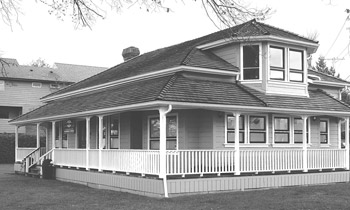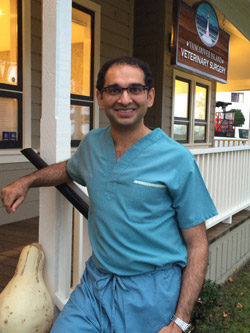Dec
7
James Bay’s veterinary surgeon
Dec 2014
By Jack Krayenhoff
Come and look with me at 152 Dallas Road. Isn’t that a handsome old house? It was built in by Dr Charles Newcombe, so a younger contemporary of Dr. Helmcken. The Newcombe auditorium was named for him.
 Nowadays it is owned by another doctor, Hanif Sukhiani, but he does not actually live there – it is the place where he works. So: his office space? Well, no. You see, Dr. Sukhiani is actually a specialist, a veterinarian with postgraduate surgical training, and he has totally transformed the interior of the house into a completely modern veterinary hospital, scrupulously kept clean, with the most up-to date steel examining and operating tables and anesthetic equipment, comparable to the best in human hospitals. Indeed, he operates on the pets fully masked and gowned.
Nowadays it is owned by another doctor, Hanif Sukhiani, but he does not actually live there – it is the place where he works. So: his office space? Well, no. You see, Dr. Sukhiani is actually a specialist, a veterinarian with postgraduate surgical training, and he has totally transformed the interior of the house into a completely modern veterinary hospital, scrupulously kept clean, with the most up-to date steel examining and operating tables and anesthetic equipment, comparable to the best in human hospitals. Indeed, he operates on the pets fully masked and gowned.
At the time he acquired the property, the house had become entirely derelict, and a contractor was ready to bring in the bulldozers and build some nice apartment complex in its place, but Dr. Sukhiani would not hear of it. He restored the outside and made the interior structurally safe again. Several times he says (seconded by Tarra, his receptionist / technician) how he appreciates and respects Dr. Newcombe’s old residence, and how fortunate he feels having his place in James Bay.
 We first sit down in the waiting room, where the center piece is the original old coal stove that once heated the living room. Dr. Sukhiani left it deliberately to create a homey atmosphere, to help the pet owners relax, who often are nervous at this point. The trouble, you see, is that the pet easily picks up its owner’s nervousness, which in turn makes the pet itself nervous and hard to examine. For this reason, Dr. Sukhiani makes sure his bedside manner (is that term applicable in a bed-less pet hospital?) is always gentle and friendly.
We first sit down in the waiting room, where the center piece is the original old coal stove that once heated the living room. Dr. Sukhiani left it deliberately to create a homey atmosphere, to help the pet owners relax, who often are nervous at this point. The trouble, you see, is that the pet easily picks up its owner’s nervousness, which in turn makes the pet itself nervous and hard to examine. For this reason, Dr. Sukhiani makes sure his bedside manner (is that term applicable in a bed-less pet hospital?) is always gentle and friendly.
What are the commonest problems Dr. Sukhiani operates on? Orthopedic conditions often occur in dogs. For instance, did you realize dogs have knees? They do, and they often get ruptured anterior cruciate ligaments in them, just like humans.
Does he do spaying? Rarely. That is usually done by non-specialist vets. By the way, this operation entails complete removal of both ovaries and the uterus; in males it likewise means castration, with removal of the testicles. Otherwise, the male would not lose his interest in females and his behaviour would remain unchanged.
Is there room for alternative medicine in animals? Dr. S. does not do them himself and expresses no opinion about their value, but yes, acupuncture, herbal treatments and other such non-orthodox treatments are available in town. And psychiatry? Well, there are therapists who specialize in modifying non-acceptable dog behaviour.
What about animals other than dogs and cats? The answer is: no birds, and no fish either. “I used to deal with horses and other big animals too”, but that was before I opened this hospital in the summer of 2014”, says Dr Sukhiani. “In the fourteen or so years preceding, I used to travel up and down the Island and did surgery on the cases of vets who had them lined up for me. But I still get referrals from up-Island, and, in fact, from the mainland as well.
